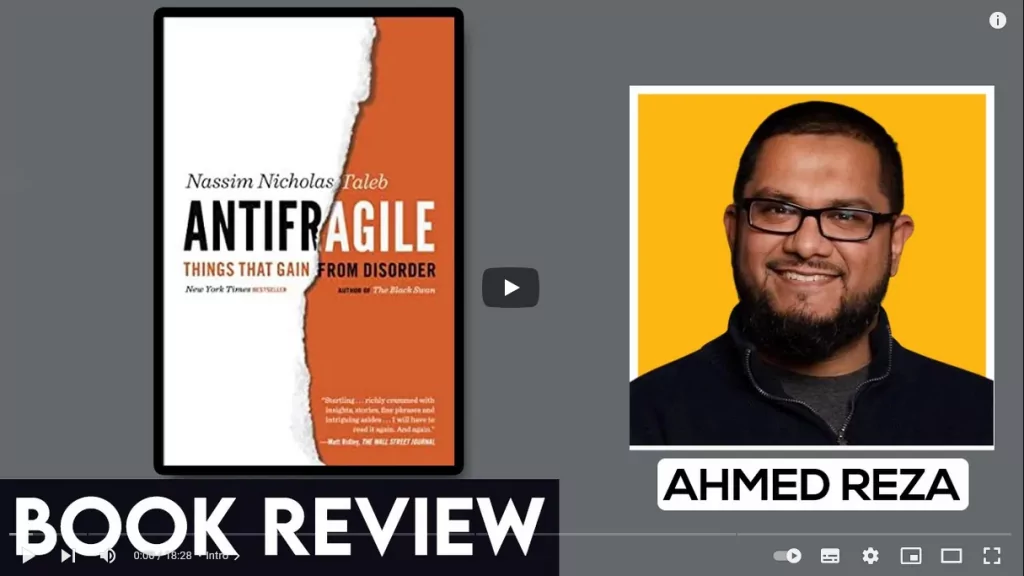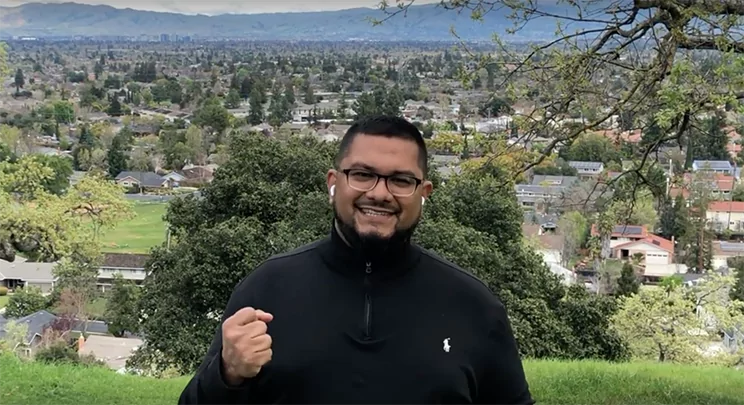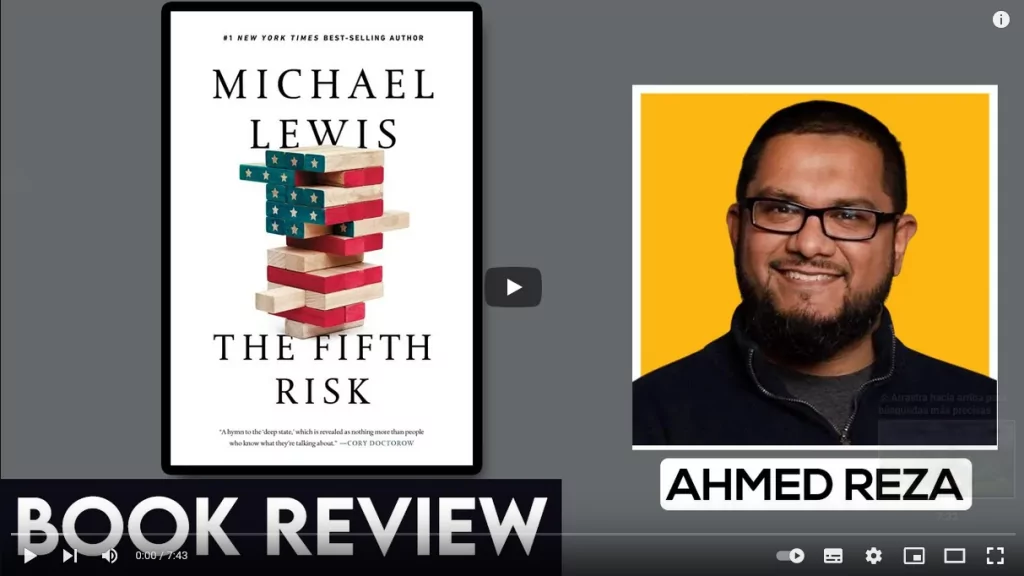Antifragile: Things That Gain From Disorder is a seminal book by Author Nassim Nicholas Taleb. In this video Ahmed’s talks about his experiences reading the book and some key takeaways.
I’ll be book called Antifragile by Nassim Nicholas Taleb. It’s a great book, it’s had a lot of impact on my own life and on how I think about business. Just my philosophy on life, business, and family. You wouldn’t think that a book can have that much impact but great books do. And in light of recent events with what’s going on with Coronavirus right now and the stock market as crazy as it is, I thought this is a good time to take a look at some of Nassim Taleb’s work.
And Nassim Taleb is – some of you probably already know – he is the famous author behind Black Swan. You kind of predicted the stock market crashes that’s happened in the past. He’s a pretty amazing guy and he’s pretty opinionated. So he thinks what he thinks and he lets you know it, which makes his books a very interesting read and certainly challenging.
So first I’m going to start out with what the basic concepts are. And the basic concepts are Do you have systems and things that are fragile in life? Do you have tough things? Then you have anti fragile things or systems that are antifragile. Today I was going to use glass or something similar that’s fragile but my camera setup over here is very fragile. And it was a funny, kind of like the universe talking to me kind of fragile because as I was setting up my iPhone on my DJI Osmo, which has to be very carefully and precisely balanced. I was setting it all up and I hadn’t thought through some things and what do you know this gust of wind comes in and knocks the thing over and that glass back on the camera is definitely fragile. Thankfully it didn’t break but funny enough to me at least that I’m talking about anti fragility if I were using a very fragile set up to do.
So again in life there are things that are fragile and a good way to kind of think about that is it’s what happens when you become soft or when you become vulnerable. Sometimes if you cuddle yourself too much, protect yourself too much, aren’t ever exposed to any viruses, or any calamities in life the very first one that hits you can just knock you off your game and that can kill you
A few hundred years ago when Westerners first went into Africa they started dying off very fast because there were viruses like malaria and diseases that their body simply weren’t used to. Whereas the locals they’re pretty used to it growing up. Or being born in Bangladesh, I sure had to fight more diseases than your average kid in the United States although now with the world being more connected maybe that’s making us more anti fragile as opposed to fragile. So with the coronavirus going on that’s a pretty interesting thing to think about.
Now, you have your fragile systems then you have your tough systems. Like steel is tough right? A lot of companies they name themselves with things that are tough. They’re just always tough like BlackRock and no offense to any of these companies. Black rocks are things that project strength but those are just top systems and sometimes you’re born tough, sometimes you’re not. So you can build the top system, you can try to build yourself to be really tough but tough has its own fragility.
Nassim Taleb introduces this concept of anti fragile where the system actually gains whenever it gets pushed and whenever it gets tested. So things like our immune system when it gets tested and it gets pushed, or like your muscles which I’ve been slowly slowly trying to work on, or like our minds actually. When you push it to the limit and you don’t break it you actually end up making it tougher. So your muscles, you work out and you’re basically assaulting your muscles and then your muscles get tougher and that’s actually pretty core to human beings to humanity. We get better with time, we get better with tests, we get better through hardships. And right now we’re suffering through some hardships, we’re getting thrown some curveballs and this is exactly where we
should shine.
Right now we’re suffering through some hardships, we’re getting thrown some curveballs and this is exactly where we should shine.
The first time I read this book I remembered it really just challenged me. It challenged me to the core because before then I’ve just gotten into entrepreneurship and I was trying to read as many books as possible to learn about how to build a business. And I was just going “oh there’s a model to doing this. And you basically just follow the
formula. You copy paste and you’ll be successful”. Until I really started thinking. I started thinking well if these big businesses are so successful, if these big banks are so successful they seem awfully fragile. I’ve worked at
some big companies myself and I’m sure some fellow engineers have felt this way as well. You’re working these organizations that are big, that are like big ships but you can almost sense the fragility in the system and that it’s not able to deal with these Black Swan events. Just for for those of you who haven’t read Black Swan, Black Swan is like coronavirus. Nobody’s been preparing for it and suddenly one day there it is. And those who are not prepared, those who are less paranoid, and those who don’t really think through the implications of Black Swan events usually get wiped out by them.
Nassim Taleb uses some language to dramatic effect. So if you’re a chicken or you’re a farm animal then you’re getting fed every day of your life. You’re like “the food just comes in every morning at this time, life is good. This dude right here gives me food”. The Black Swan event is the day that you get slaughtered. You’re getting prepared for slaughter and when that day comes you are not prepared for it. It’s a very terrible and dramatic way of describing it but I think it gets to the point of it is that’s what fragility does. You don’t test these systems that are built to be anti fragile. Nature by nature is actually anti fragile. If whatever calamities happen some trees, some animals they adapt and they get stronger, they get better, they thrive.
Ever since the beginning of my business career I’ve been thinking and reflecting on this book and asked “how do
you build an anti fragile business?” Well, I don’t know if you really can build a really ginormous anti fragile business. If anyone has one it’s probably Apple and part of the reason they feel they have a more anti fragile business is they routinely just inject disruption. They don’t just say “okay we’re just going stick with the Macs and never innovate”. But they innovate. They cannibalize their own products but they continue to dominate the market. For startups I think you can’t not be anti fragile. For entrepreneurs that’s not really an option especially when the stock market does what it’s doing right now the VCs are all shut down. They’re doubling down on the safest bets possible. That’s when you really need to be anti fragile and I personally believe that the best way to build an anti fragile business is to have an anti fragile culture. A culture that values learning, a culture that does value moving it fast. I know it sounds like Facebook “move fast and break things” but you have to have people who are resilient, who are agile, who aren’t just stuck in one way of doing things because your business after all is just a cumulative emergent phenomena of a bunch of people working on it. Especially if it’s a service-oriented SAS or knowledge work-related business, if it’s not a factory for example. Factories actually are fragile. I have business interests in factories and I know they can be fragile because if the machine breaks or if there’s an earthquake you’re down. The machine is a single point of failure. So can you make a factory anti fragile through culture? Maybe a little bit right? But definitely a business that relies on people like software businesses, service businesses, marketing firms, and much of what the US economy is based on and it can be anti fragile.
I’m actually taking the concept of anti fragility into my family life, in my personal life as well. I know like seeing my body you probably go “it doesn’t look like you’ve been working out those muscles too much Ahmed” and you’d be right. But in my mind I figured I’d let me try to do the same thing to my mind, let me read more, learn more, reflect more personally and do those things like athletes do. Athletes train right in my craft how can I train? How can I keep myself fit? How can I keep my brain fit and my mind fit? And same for my family. One of the things I noticed after a couple of years in business was life is good, things were good. And I noticed with my kids that they were starting to maybe become fragile. They were asking me questions like “My friends have butlers, they don’t have to do chores. Why do we have to do chores?” And I started to get scared. Prior to that I just copy pasted thoughts for most other people. I thought “hey if I leave my kids a lot of money they’ll be fine” and that’s not true. That is not true at all. I think the best thing that I can leave my family and my kids is the ability to be anti fragile, the ability to adapt to be agile and just roll with the punches. You never know what’s gonna happen. We don’t know what that Black Swan event is going to be but rest assured there will be Black Swan events. The coronavirus, who knew? We don’t know what the next thing is going to be but there are so many moving pieces the only thing that’s for sure is that something is going to happen. It’s always going to happen. You can look in the past and you can extrapolate to the future. Empires have fallen because they became fragile.
So what’s a good way to make yourself anti fragile? It’s like getting a virus or it’s like you know getting your flu shot. So what your flu shot does is it injects a little bit of viral material into your veins but it trains your immune system on how to kill it, how to destroy it and actually makes you stronger. Initially when you get a flu shot you might get a fever but the benefit of it on the other side is when one of those strains of viruses hits you it won’t kill you. So being anti fragile from an immune system perspective is pretty essential to what the immune system does.
So apart from business just in normal life I thought a lot about how can I use this concept of anti fragility? In parts of your life where you have the most rigidity? And of course I have quite a ways to go one of the big places where I have to make improvements is my personal health. So even though I don’t have to come up to mountain top to do these videos I try to make it a point to come up. I love coming up here looking at the views and you have the occasional folks looking at me weird like what is this guy doing talk to his phone. Hopefully that helps my anti fragile physical body as well.
So the other thing I wanted to bring up is I never really appreciated philosophy before this book and again this is just my own personal journey but philosophy can have a significant impact on the real world even though I initially looked at it as something very theoretical like yeah philosophers they just just sit around and talk about stuff. But reading the same columns book it was it was kind of jarring and eye-opening at the same time because the philosophy part of it made me question what are my core beliefs, how do I really think? Because I accepted a lot of things as they are or as they were. For example, one of the things that he brings up is his Western education, a product of Western success or as Western success a product of the education?
Most of the world tends to think that you go to Harvard, you go to MIT or you have western-style education that’s what gives the Western world all of these successes, all of these material successes. But he questions that very premise and he says is that really true? And of course no surprise here’s a guy in Silicon Valley saying higher education isn’t all that it’s trumped up to be. But it’s important to actually think about that fact that MIT only admits the very best. Harvard only admits the very best. So there’s kind of that selection of people. And then you don’t see millions of Harvard graduates all being equally successful, there are a few. There are super successful others who aren’t. And if you actually look at very successful CEOs or whatever your criteria for material successes you’ll notice that there are people from other walks of life who are generalists. Steve Jobs famously was not a Harvard grad or an MIT grad. He was just wandering around in India trying to figure life out. And it would be wrong to say “oh he didn’t follow the formula, therefore he should not be successful”.
But those are the things that we think about that we take for granted and there’s inherent fragility when you think about systems like that when you create systems where people don’t think outside the box that much and that’s probably one of the more anti fragile. The better secrets of Western society is that the rebellious spirit – thinking outside the box – something that’s not necessarily encouraged all around the world has been key to success and one of the reasons there’s a lot more innovation here, at least in my opinion. And I know that’s now not the case all around the world but I think those are some recent changes.
Now Nassim Taleb’s best part is when you read his books like I said he shakes you. You don’t expect you know the kind of language or the kind of delivery coming from a scholar. He’s a very unlikely scholar, as a matter of fact he’s a mathematician and also apparently a martial artist and he has this breadth of experience. And talk about this concept of “f money” which is the concept of having enough money to do or however you want. Well which also was a novel concept in my head because growing up I always thought okay you go to college, you get a great job maybe you go into business or maybe you do something else and then boom billionaire that’s success. Nassim Taleb’s book helped me get challenged with the concept of success and freedom.
I think I’m going to have to finish this video sooner than I thought because the wind picked up like crazy and the camera and the rest of the equipment as I was mentioning is not as anti fragile. As a matter of fact it’s very fragile so it fell over when the wind gust really picked up. So I hope I got most of the concepts in there. There’s more I wish I could get into but I didn’t mainly as you read more about it I think you’ll realize how influential of a book Antifragile is and how great of an author Nassim Taleb really is. I love following him on Twitter if you get a chance he’s hilarious and interesting and very insightful so during these tough financial times and uncertain times it’s good to keep anti fragility in mind. Thanks!



